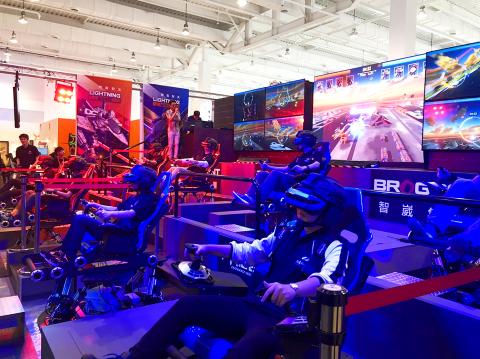Brogent Technologies Inc (智崴資訊), a manufacturer of theme park rides and flying theaters, is looking to tap the virtual reality (VR) e-sports market by leveraging its expertise in building 4D motion simulation systems.
The company last week unveiled Lightning Wings (閃電對決), its new competitive gaming title where players don VR headsets and pilot giant robots in battle.
Players must also wrestle with simulated motion feedback as their virtual cockpits heave and yaw with each maneuver in heated combat.

Photo courtesy of Brogent Technologies Inc.
Compared with sport titles with keyboard-and-mouse controls, the combination of VR and 4D motion simulation makes a much more compelling spectator sport experience, Brogent chief executive officer C.H. Ouyang (歐陽志宏) told an investors’ conference in Taipei.
“We’ve had a captive audience during a Lightning Wings tournament held at the Vision Get Wild exhibition in Kaohsiung last week,” Ouyang said.
“Much like the leap from feature phones to smartphones, we believe that VR and motion simulation is the future of e-sports.” Ouyang said, adding that the company would continue to seek partnerships to develop more titles and e-sports events to create monetization opportunities.
Ouyang was upbeat on earnings this year, as the company expands its flying theater offerings.
While the company has achieved market dominance with i-Ride, its premium flying theater system, Brogent is planning to launch m-Ride, a more accessible variant at half the price before the end of this year, Ouyang said.
He said that m-Ride takes only eight months to set up and is designed to be portable and suitable for short-term installations, such as exhibitions, while i-Ride takes 14 months to set up and requires 15m-high venues.
Despite its lower pricing, m-Ride installations are still expected to maintain favorable margins of 20 percent, Ouyang said, adding that its top-of-the line i-Ride costing between US$5 million and US$20 million per facility accounted for 90 percent of total sales as of the end of the first quarter this year.
The company, which has sold 29 ride installations to theme parks around the globe, expects to see significant growth in recurring revenue from content licensing and maintenance as it sets up its 100th installation in the next three to five years, he said.
Brogent reported that net income in the first three months dipped 15 percent annually to NT$37.98 million (US$1.27 million) due to higher research and development costs and foreign exchange losses. Earnings per share were NT$0.86.
Sales during the period rose nearly 10 percent annually to NT$350 million.

Sweeping policy changes under US Secretary of Health and Human Services Robert F. Kennedy Jr are having a chilling effect on vaccine makers as anti-vaccine rhetoric has turned into concrete changes in inoculation schedules and recommendations, investors and executives said. The administration of US President Donald Trump has in the past year upended vaccine recommendations, with the country last month ending its longstanding guidance that all children receive inoculations against flu, hepatitis A and other diseases. The unprecedented changes have led to diminished vaccine usage, hurt the investment case for some biotechs, and created a drag that would likely dent revenues and

Macronix International Co (旺宏), the world’s biggest NOR flash memory supplier, yesterday said it would spend NT$22 billion (US$699.1 million) on capacity expansion this year to increase its production of mid-to-low-density memory chips as the world’s major memorychip suppliers are phasing out the market. The company said its planned capital expenditures are about 11 times higher than the NT$1.8 billion it spent on new facilities and equipment last year. A majority of this year’s outlay would be allocated to step up capacity of multi-level cell (MLC) NAND flash memory chips, which are used in embedded multimedia cards (eMMC), a managed

CULPRITS: Factors that affected the slip included falling global crude oil prices, wait-and-see consumer attitudes due to US tariffs and a different Lunar New Year holiday schedule Taiwan’s retail sales ended a nine-year growth streak last year, slipping 0.2 percent from a year earlier as uncertainty over US tariff policies affected demand for durable goods, data released on Friday by the Ministry of Economic Affairs showed. Last year’s retail sales totaled NT$4.84 trillion (US$153.27 billion), down about NT$9.5 billion, or 0.2 percent, from 2024. Despite the decline, the figure was still the second-highest annual sales total on record. Ministry statistics department deputy head Chen Yu-fang (陳玉芳) said sales of cars, motorcycles and related products, which accounted for 17.4 percent of total retail rales last year, fell NT$68.1 billion, or

In the wake of strong global demand for AI applications, Taiwan’s export-oriented economy accelerated with the composite index of economic indicators flashing the first “red” light in December for one year, indicating the economy is in booming mode, the National Development Council (NDC) said yesterday. Moreover, the index of leading indicators, which gauges the potential state of the economy over the next six months, also moved higher in December amid growing optimism over the outlook, the NDC said. In December, the index of economic indicators rose one point from a month earlier to 38, at the lower end of the “red” light.